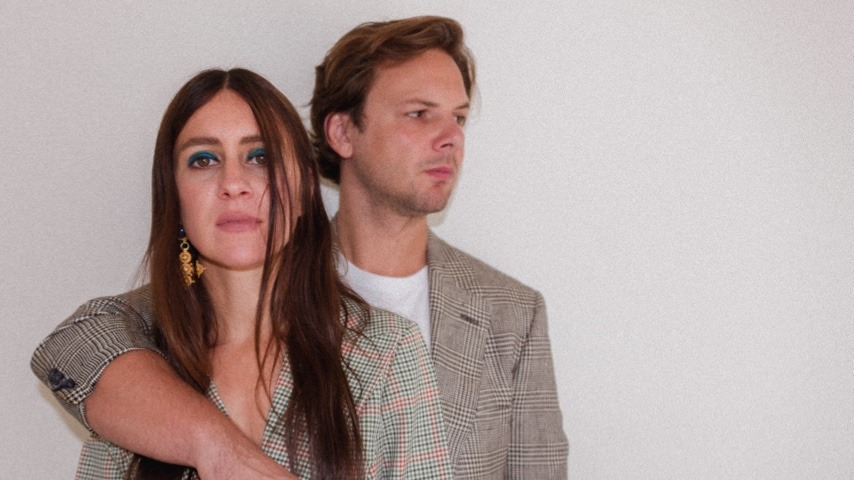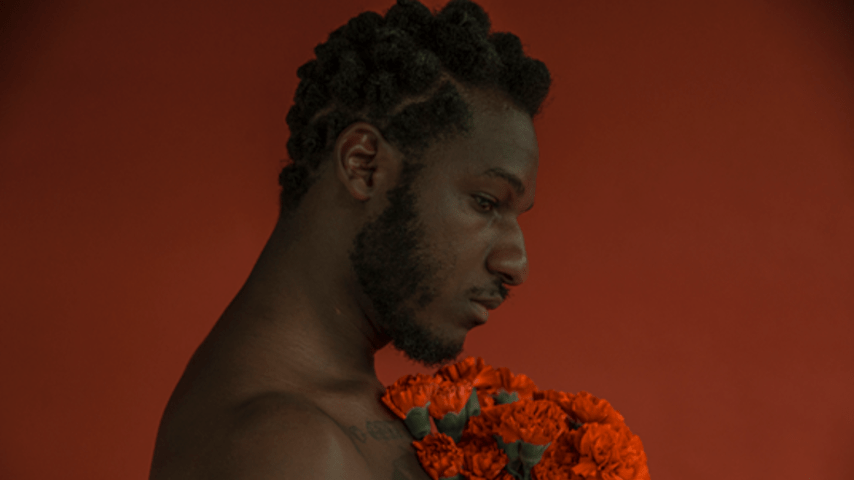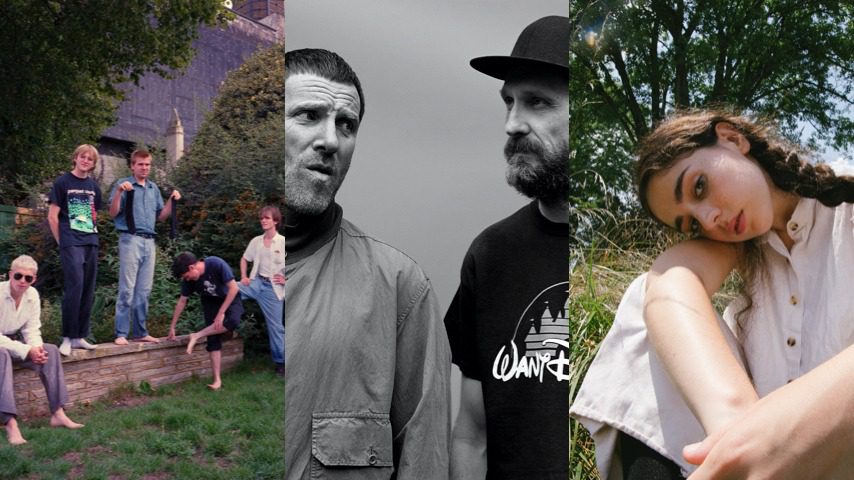For former high school sweethearts who first met in their native Munich, vocalist Nini Fabi and her multi-instrumentalist significant other Benny Gebert are doing pretty good, all things considered. They’re still together at 36, and making gorgeous, ethereal alt-pop music in New York as Haerts, a quartet now whittled down to a DIY duo.
And now—with their year-old daughter Anna in tow, they’re preparing to waive winter goodbye forever and move to warm, inviting California in a couple of weeks, where they will continue promoting their latest velvet-textured masterpiece, Dream Nation, which drops today. These ominous numbers—like the ’60s-echoed “Night Calls,” a crypt-hollow “Shivering,” a trippy pop-psychedelic plaint called “For the Sky” (with a cameo from Grizzly Bear’s Ed Droste), and the ’70s-soulful hip-shaker “Days Go By” (which boasts the prophetic lyric, “When I go to California/ The sun will rise again”)—were all penned pre-COVID-19 in an intense month-long session, then recorded in an equally-rapid-fire week in New Orleans.
“But we wrote the record while I was pregnant with Anna, so mortality was definitely on our minds,” says Fabi, whose truly unusual trill flickers like a zoetrope throughout the project, often sounding like it was beamed in on the wireless from some bygone golden era.
The dark finality of death, surrounding a bright optimism associated with birth—the contrast was palpable to the young couple for most of 2020. “And they were so close together that was what we kept thinking about, because for pretty much of Anna’s whole first year we were in lockdown,” Fabi sighs. “So there were these weird contradicting realities, where there were all these horrible things going on around us, but in our little world, everything was about new life. We were experiencing all these little miracles every day, and through her seeing everything differently.”
Luckily, neither she nor Gebert have been personally affected by the pandemic, and they were lucky enough to be in Germany with their respective families when international travel restrictions kicked in last March. So, knock on wood, Haerts is just happy to be here with a cohesive, decidedly spiritual-minded new opus to give to the world. “We were very lucky in that we haven’t lost any friends close to us, and we stayed healthy throughout,” adds Fabi. “So I think on a larger scale, we came through it—or are going through it—pretty well.”
Paste: How was it being in Germany when this all began?
Nini Fabi: Both of our families are back there, and we just happened to be in Germany when the travel ban started. So we ended up pretty much spending the first part of last year in Germany. We didn’t want to travel at the time, and we didn’t want to come back here, really. And I can’t speak for how it felt here, because we were over there at the time. But over there, things felt contained, in a way. And at one point, we felt that if something had happened to us, we would have good health care there. And people there, for the most part, just wanted to go with the program, and I think with [Angela] Merkel, you had someone who really laid it out well and was very clear.
Paste: Like Jacinda Ardern in New Zealand.
Fabi: Yes. All the women in power.
Paste: Still, it’s the little unforeseen things that can trip you up. You just had to go to the hospital last week after slipping on the winter ice?
Fabi: I did. I fell on ice last week and I fractured my knee. So I’m in a little bit of recovery right now, but it’s definitely getting better already. But it was not pleasant.
Paste: This might seem like a weird question, but have either of you—or you, Nini, specifically—ever had a past-life regression? Or felt an affinity with another era, like you might have lived before?
Fabi: Okay. That’s really funny, because I always did have the feeling that I might have had past lives, and I always thought that this would be my last one—I never had the feeling that I would have another life after this one. So I felt that there have been other lives, and I was talking with a woman at one point, and she was telling me about my previous lives, and there were a bunch of interesting ones, but I know that one previous life in particular was almost in medieval times, and I was this man, this very crazy fighter, and I think he passed in a battle. And then she told me about this other life, which was in the ’20s, which was a woman who was an artist, but she didn’t end up doing art because she somehow couldn’t get the courage together to follow her path. So I did have a few of those.
Paste: I’m looking at my notes right now, and I wrote “1920s?” Spooky.
Fabi: Seriously? That’s funny.
Paste: And they say we’re soon going to be reliving that post-WWI era—with flaming youth, flappers, champagne bathtubs—once COVID-19 clears and people can party like there’s no tomorrow again. But there’s just something about your vocal delivery that feels 1920s, almost Art Deco.
Fabi: I mean, it’s kind of crazy that you’re saying this, because it wasn’t something we were really thinking of. But we’re intensely into the ’20s right now. And I don’t know if you’ve seen it, but we’ve been watching this show called Babylon Berlin, and it’s amazing, because Germans? They don’t really make good television at all—most of their television is just not very good. But I think this is probably the best they’ve ever done— it’s set late in the Weimar Republic, and it’s all about the 1920s, and it has that energy of amazing music. And we’ve definitely been feeling that energy. I mean, not right now. But one of the things that we talk about a lot is this hope to come out of this and have these golden ’20s and have ths Renaissance of music and art. There was just something fearless about them then, and freaky—it was the kind of world where people would go out and dance all night and just be who they wanted to be, especially in Germany, where everything went backwards after that. But we often were talking about that, because it was such an amazing time. And if Hitler hadn’t come into power after that, who knows where Germany could have gone? Just creatively and culturally? I love that time. We both love that time. It’s also in a way a very tragic time, because whenever you read about it or watch something about it, you just know what’s next after that.
Benny Gebert: And it’s interesting, because there are so many parallels to what’s going on right now—with the whole push to the right and the instability in the world—all these factors that contributed in a large extent to Hitler being able to get into power. Fortunately, though, I think we did just get rid of the monster. Hopefully. He was a pretty bad guy, and we’re happy that he’s gone.
Fabi: Yes. There was a real sense of relief that day [of the U.S. election]. It was, in a way, exactly the right time for this election. As sad as that is to say.
Paste: Just watching Malcolm and Marie on Netflix, I was struck by what was possible in post-pandemic filmmaking. But can you imagine how lockdown-viewed filmmaking will probably inspire a whole new generation of young actors and directors?
Fabi: I think so, too. And obviously, you can showcase your music and your art everywhere now, at all times. But I do think that all the music you’re making now in this time of isolation, all the art, there’s no mirror for it. For us, for example—there’s no touring, so we don’t have an audience that can be reflecting back to us. And I think a lot of times as an artist, you start making music for yourself, and then people get other reasons why they make it —like, they want to do the show, they want to get the reaction. But now it’s a time where you don’t have that, so now the only reason why you’re still making it is because you’re going to be making it for yourself. Especially if you’re doing music. So it’s going to be interesting to see the music that comes out of this. I mean, we wrote these new songs before COVID. But it’s odd that a lot of music now is about this kind of nightlife and world, this kind of place where people can be themselves and where you can dream this dream that might not be realistic, but it kind of keeps you going. In a way, it’s like listening now to our music, and coming back to it now as we’re getting ready to release it, it just makes so much more sense.
Paste: Your track “Strange Love” has that classic old blues trope, sung best by Sam Cooke, that ‘Nobody knows you when you’re down and out.’
Fabi: Yes, I know. And it’s true, maybe, because I think sometimes you think nobody knows you when you’re down and out, but maybe they actually do. And that was a song that talks about how it’s so much more isolating and so much more lonely when you just think that you’re completely alone, but I think a lot of ties you actually aren’t. I mean, lots of people are different, and everybody goes through their own experience, but there is a collective experience, and it can actually be a great relief. So many times, throughout our lives—or throughout anybody’s life, I think—you feel very much like a stranger, really, or strange to situations or things like that. I remember when we wrote that song, I was reading something about Frida Kahlo, and she had this thing in her diary, where she felt totally bizarre and very different, and she wrote this bit that was almost like a letter to someone that she didn’t know, someone that she just hoped to be out there, who felt the same way that she felt. And that made everything better for her.
Paste: But most of the forces at work on Dream Nation are much bigger and stronger, like the night, the sky.
Fabi: We’re still asking questions, maybe. In a way, when you listen to a song firsthand, it can have a sudden effect on you—you can cry, you can start dancing like crazy. I think music has this way to go really deep. And for us making this record, the process of making it felt very similar to that—we did it very quickly, and we didn’t really go in with that concept—of wanting to do his kind of record. But the music—and just writing the songs—really brought it to the surface. So the process proved more freeing, and being less restrained from trying to do something actually felt really good. It’s all about what we’ve learned. What we, for example did on the first record [“2014’s Haerts], Benny and I have never been satisfied with, because someone else was in control. And on the second record [New Compassion in 2018], we kind of moved away from that, and then now on the third record, we were kind of like, “Fuck it! We’re just gonna do the music that feels right for us!”
Paste: Well, one bit of German culture has made its way to America now—late at night, on bridges and other highways, people are driving at breakneck speeds, even racing each other, like it’s the Autobahn.
Fabi: Oh,my God! That’s frightening. And dangerous! Do they want to die?
Paste: Have you guys picked up any new hobbies during lockdown that don’t involve high-speed chases?
Fabi: Well, to be fully honest, there’s another little human being that makes that impossible right now. I mean, it’s not a hobby, for sure. But I would say it’s a deep learning curve that we’re having here. But we’re definitely not doing a children’s album with our next record—we can tell you that much. We’ve been doing this band for a long time now, so we’re excited to see what the next step is.




